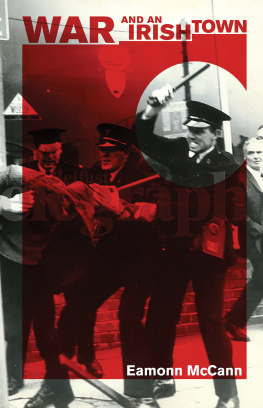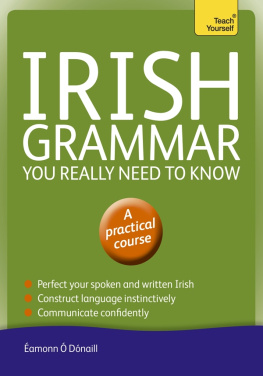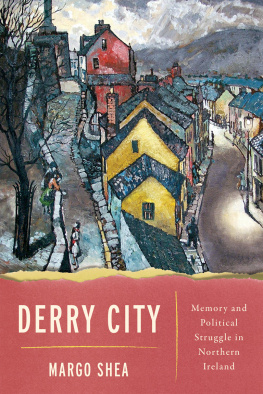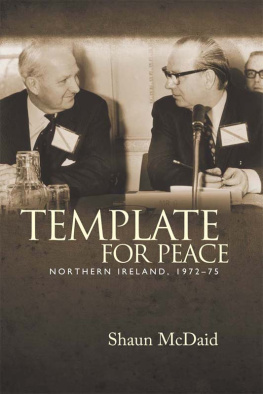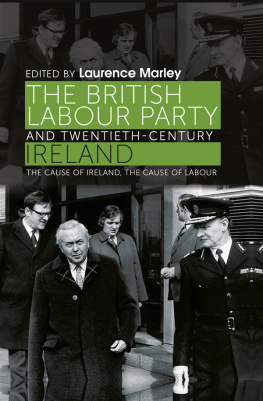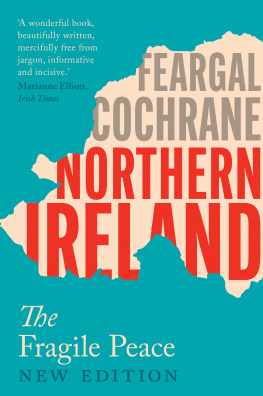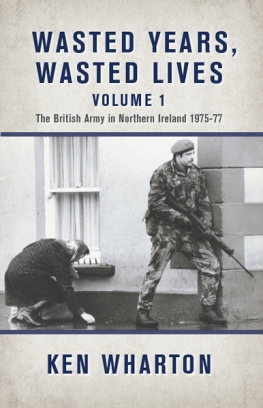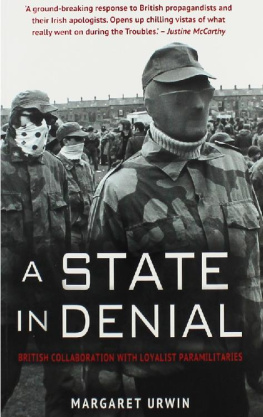Part 1
W hen I was a very small boy we used to sing at passing Protestants:
Proddy, proddy dick
Your ma cant knit
And your da
Wont go to bed
Without a dummy tit.
We might meet Protestants on the way to school because our school was outside the Bogside. No Protestant lived in the Bogside. The Unionist Party had seen to that. Not that the absence of Protestant neighbours was regarded by us as any deprivation. We came very early to our politics. One learned, quite literally at ones mothers knee, that Christ died for the human race and Patrick Pearse for the Irish section of it. The lessons were taught with dogmatic authority and were seemingly regarded as being of equal significance. Pearse ranked high in the teeming pantheon of Irish martyrdom. There were others. They had all died in the fight to free Ireland from British rule, a fight which had paused in partial victory in 1922 when twenty-six of our thirty-two counties won their independence. It was our task to finish the job, to cleanse the remaining traces of foreign rule from the face of Ireland.
No one was explicit as to how this would be done. Some said that Catholics, because of their higher birth-rate, would one day outnumber Protestants in the Six Counties and that we could then vote ourselves democratically into an all-Ireland republic. Vague confidence was occasionally expressed that eventually the Protestants themselves would re-discover their Irish national heritage. And there were always those who said that sooner or later we were going to have to fight for it. We recognized that it was not an immediately attainable object, that it was not going to happen tomorrow, but no one ever doubted that someday, somehow, it would come, and at moments of greater patriotic fervour we sang of it; that Ireland, long a province, would be a nation once again.
We learned of the United Irishmen, the Fenian Movement, the Easter rising; of Emmet hanged, and Tone who had cut his throat in his cell to cheat the English executioner; of Connolly who was wounded in the leg and could not stand up so they strapped him to a chair to be shot; snatches from Pearses speech at the grave of ODonovan Rossa: The fools, the fools, the fools, they have left us our Fenian dead There were men in the area who embodied the traditionPaddy Shiels, Neil Gillespie, Sean Keenan, Old Republicans who had fought in the past and been jailed and whose suffering represented a continued contribution from our community to the age-old struggle. They were regarded with guilty pride by the great majority as living out too urgently the ideals to which, tacitly, we were all committed. When Paddy Shiels died everyone said that he was a Great Irishman.
Frankie Meenan was of the same stamp and always resented the fact that he had to speak English to make himself understood in the area. He ran classes in Gaelic for local children in a disused billiards hall in Chamberlain Street. Rows of children, few of whom would ever progress beyond primary school, would sit reciting in unison, Ta me, Ta tu, Ta se, Ta si I am, you are, he is, she is, and wrestling with the intricacies of the vocative case. Women in the street would ask Frankie: Hows he getting on at the Irish?, to which he always replied: Oh, coming on, coming on. Few ever became fluent, but it was felt right to make the effort. Frankie probably paid for the hire of the hall himself. He bought about thirty hurling sticks once and on Saturday mornings would take a crowd of us up to a field behind the Rosemount School, distribute the sticks and try to teach us the national game. The instructions were shouted in Irish, Anois, Buail e, buail e ! and Ach, amadan , bloody amadan (Now hit it, hit it! Fool, bloody fool!) when one missed the ball completely for the n th time. There were always those who, privately, affected amusement at Frankies activities, but no one openly denied him respect.
The Irish lessons and the hurling classes ended when Frankie was arrested one night in 1957. It was during the IRAs border campaign. He was coming home when a police car stopped and he was asked his name. He could have said, Frankie Meenan but, being what he was, he said, Prionsias OMianain, ta me ag dul abhaile (I am going home), for which piece of bilingual impertinence he was taken to Crumlin Road jail in Belfast and held without trial for seven months. No one came out to riot about itthere was no point. He was released for his fathers funeral and in an outburst of humanitarianism the then Minister of Home Affairs, Brian Faulkner, did not order his rearrest. Some months later Frankie went to live in Dublin.
What people like Frankie Meenan and Sean Keenan sought was not to be sneered at, but at the polls votes went to the Nationalist Party, who had a more realistic approach. My political cradle was rocked by Mr Eddie McAteer, Nationalist MP for Foyle until February 1969, who has, I believe, come to rue the day. I sat on a high chair in his election headquarters copying names and addresses from the electoral register on to his polling cards. Beside every name on the register was either an orange or a green mark. One was pleased to turn over and discover a page with a preponderance of orange marks. Such pages were easily done. Orange marks denoted Protestants, and Mr McAteer did not send polling cards to Protestants.
Mr McAteer was a scion of Derrys premier Republican family. His brother, Hugh, had been chief-of-staff of the IRA and in 1941 had led a fabled escape from Belfast prison. The family connection did Eddie no political harm. He had a way with hecklers. At an election meeting in Cable Street once, he faced opposition from a small group noisily urging a boycott of the Stormont Parliament. From the back of the flat-bed lorry which served as a platform Mr McAteer surveyed them sadly and said: There are times when I weep for Mother Ireland, which he then proceeded to do. Real tears coursed down his cheeks and, reaching up for the corner of the Tricolour which fluttered over the platform, he dried his eyes on the national flag. He won that election, of course. The Nationalist Party always did.
In the fifties and early sixties the only organized opposition came from ad hoc trade-union groups, which would put forward one of their number as an Independent Labour candidate. Mr Stephen McGonagle, local organizer for the Irish Transport and General Workers Union, made a number of such sorties into politics. When he did it was said, and widely believed, that he was a communist. Red paint was splashed on the front of his house in the middle of the night. Some suspected that it would be a mortal sin to vote for him. Actually, Mr McGonagle never had a communist thought in his life and in later years has been praised by industrialists and government ministers for his eminently reasonable approach to labour relations. But at the time the suspicion was powerful enough to deprive him of whatever remote chance of success he might have had. On election days Mr McAteers loudspeaker cars would tour the Bogside blaring that The Protestants in Belmont are all voting for McGonagle, which was enough to clinch the matter.
The fear that it was possibly sinful to vote against the Nationalist Party was quite real. The party was closely associated with the church. Its basic unit of organization was not the electoral ward but the parish. The local parish priest would, in most cases automatically, be chairman of the convention called to select a candidate. Mr McAteer was once opposed by a man who had been defeated for the nomination at a convention chaired by Monsignor ODoherty, parish priest of the Waterside, and who had refused to accept the conventions decision, alleging that the vote was rigged. It was said of him that not only would it be a sin to vote for him but that he himself, by standing, was guilty of sacrilege. Nationalist candidates were not selected; they were anointed.
Next page
